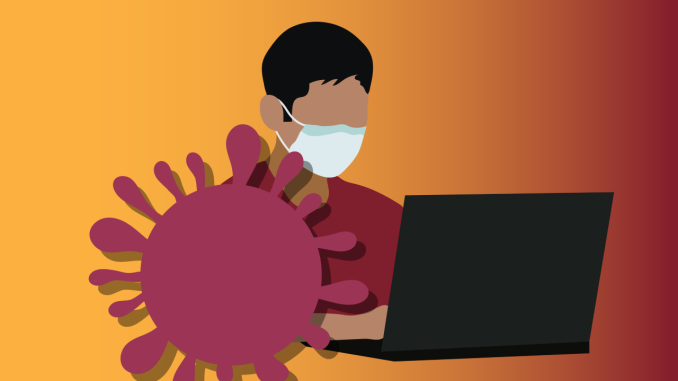
On Jan. 21, Temple University confirmed classes will resume in-person instruction for the Spring 2022 semester on Jan. 24, but with updated guidelines for masking.
Students and employees will now be required to wear KN95 masks, surgical masks with cloth masks over them or surgical masks with multiple layers of nonwoven materials inside campus buildings.
Although Temple has guidance and policies regarding COVID-19 booster shots and testing, it is not sufficient because it fails to mandate boosters and require all students to get tested for COVID-19, despite those measures being necessary to decrease the spread of the virus.
If Temple does not require students to take those preventative measures, it is up to students to make sure they socially distance, get their boosters and frequently get tested to prevent COVID-19 cases from rising.
SOCIAL DISTANCING
While Temple’s announcement covered testing, masking and booster shots, it only recommends maintaining a safe distance and uncrowded conditions whenever possible but does not require social distancing in classrooms, according to its website.
Tiffany Montgomery, a nursing professor, hopes that Temple won’t hold classes at capacity, and instead allow students to be socially distanced.
“We need to have enough space for people to be in, we should not be enrolled where students are sitting in every single seat,” Montgomery said. “Classrooms just cannot be at capacity.”
Recommending and requiring social distancing are two separate things. Classrooms must be required to be spread out safely to ensure it actually happens, and they must be large enough for students to remain six feet apart.
Temple’s current plan is insufficient without social distancing in the classroom, said Shayonna Price, a senior middle grades education mathematics major.
When students go back into the classroom, they’re not spread out and socially distanced for safety, Price said.
If a person is not up to date with all recommended COVID-19 vaccines, including any boosters when eligible, they should stay at least six feet away from others, especially if they’re at higher risk of getting very sick with COVID-19, according to the Center for Disease Control and Prevention.
Without this requirement, it is up to students to avoid large gatherings outside of the classroom, especially if they do not have a booster dose.
BOOSTERS
All eligible Temple students are strongly urged, but not required, to receive a booster shot at least five months after receiving the second dose of the Pfizer BioNTech or Moderna vaccines, or at least two months after receiving the Johnson & Johnson vaccine.
Though boosters are not mandatory, Temple has made them available to students on Main Campus, where Health Services holds weekly vaccine clinics at Paley Hall. Students should take advantage of this access to boosters and increase their immune response against COVID-19.
However, nearby schools like Drexel University and St. Joseph’s University require booster shots for students and faculty members who are eligible, or are within 30 days of their eligibility, Billy Penn reported.
Getting booster shots is one of the best ways to prevent serious infection, said Graciela Jaschek, an epidemiology professor.
“If you are boosted, then your chances of getting hospitalized or dying are much, much lower, and that to me, at the end of the day, is what we want,” Jaschek said.
Booster shots are 90 percent effective at preventing people from being hospitalized after contracting with COVID-19, according to the CDC.
TESTING
Testing plays a key role in efforts to contain COVID-19 by identifying infected individuals to prevent person-to-person transmission.
Ninety six percent of infections on college campuses could be prevented by routine testing in conjunction with extensive physical distancing and mandatory mask policies, according to the CDC.
While students who have received a COVID-19 vaccine exemption are required to get tested at least once or twice a month, vaccinated students do not have to be regularly tested.
Broad PCR testing is going to be very important because there are many false negative rapid tests with the Omicron variant, Jaschek said.
Rapid tests were found to detect 95 percent of infections in people with high viral loads, but missed about 35 percent of COVID-19 cases later detected with PCR tests, U.S. News & World Report reported.
If someone is not up to date with their vaccines and booster and they’re exposed to COVID-19, they should get tested at least five days after exposure. If an exposed person develops symptoms, they should get tested immediately, according to the CDC.
Testing among all students should occur at least twice a month to help facilitate the large student body, and to ensure that no one is sick. However, if Temple does not mandate universal testing, students take initiative by getting tested.
The university has testing available for asymptomatic students in Mitten Hall, and testing for symptomatic students in Morgan Hall.
No matter what Temple requires, students must be proactive and responsible with their health and safety.


Be the first to comment